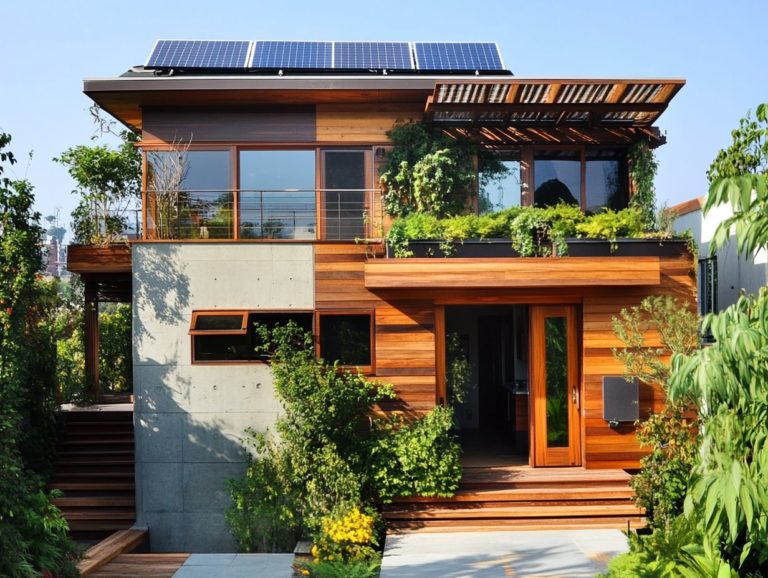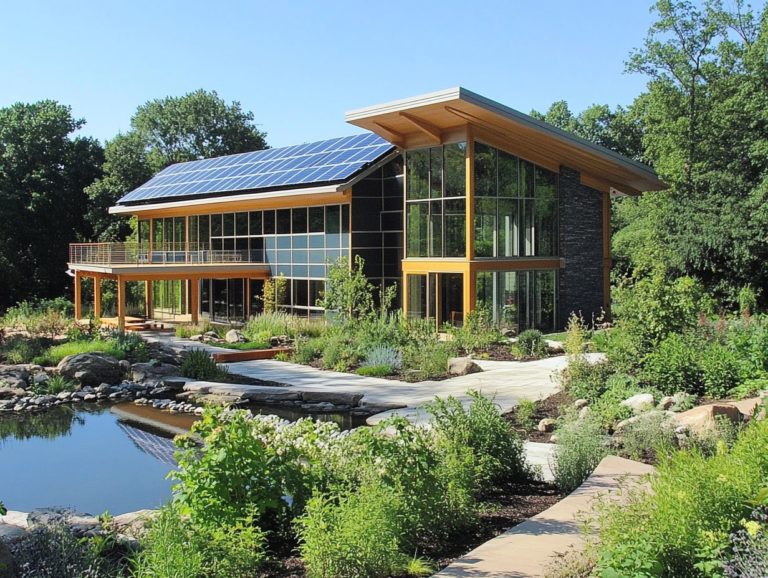How to Choose Sustainable Countertops
In today’s world, making eco-friendly choices in your home is more important than ever, and countertops are no exception. Opting for sustainable countertops not only enhances the beauty of your kitchen but also significantly reduces your environmental footprint.
This article delves into the various types of sustainable materials available, highlighting their durability and maintenance requirements. You ll discover essential factors to consider when selecting the perfect countertop for your space, along with expert installation tips and eco-friendly practices tailored for your kitchen.
Embrace sustainability and elevate your home s design to a whole new level!
Contents
Key Takeaways:
- Consider the environmental impact when choosing countertops, as natural and recycled materials are more sustainable choices.
- Weigh the factors of cost, availability, durability, and maintenance when deciding on sustainable countertops.
- Proper installation and maintenance techniques can contribute to the sustainability of your countertops, as well as incorporating eco-friendly practices in the kitchen.
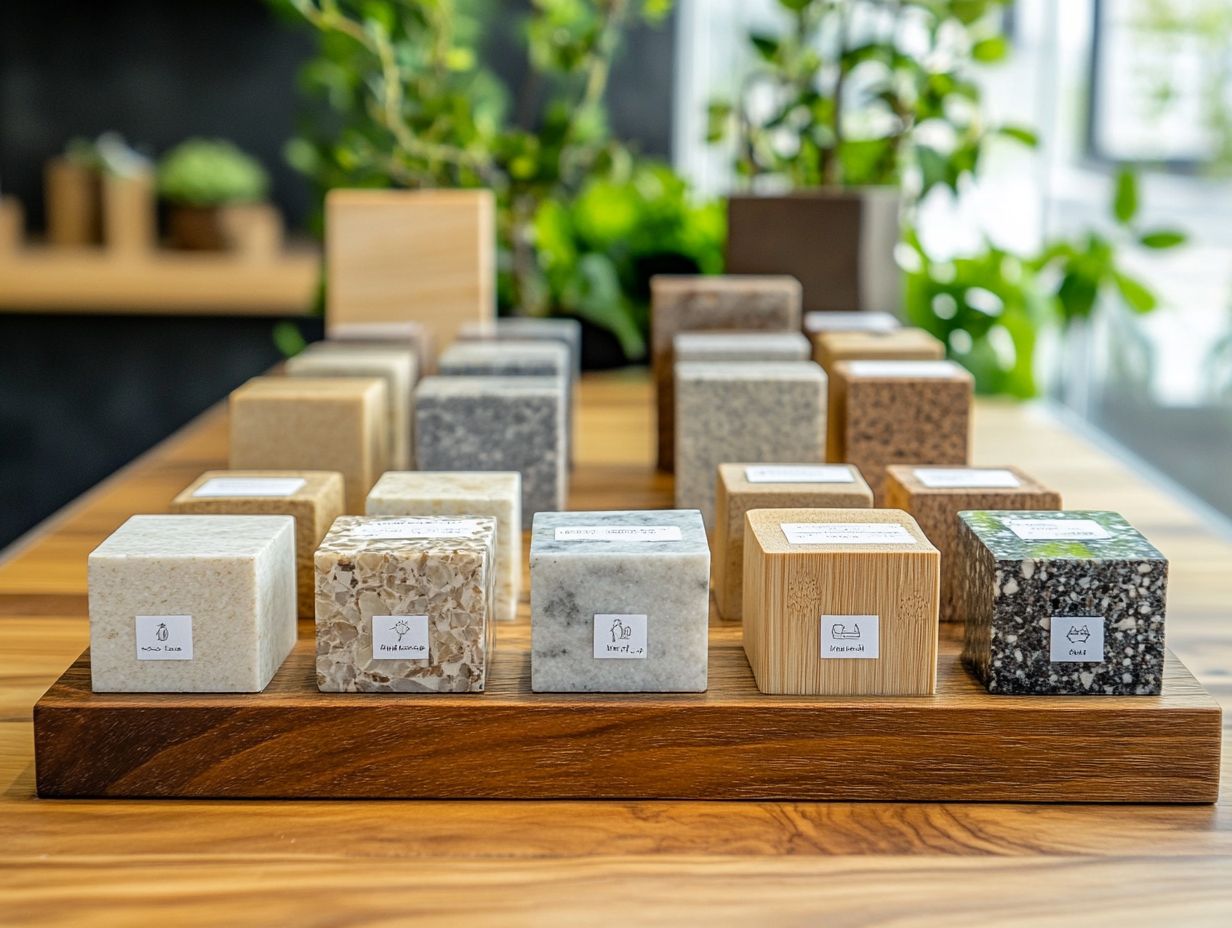
The Importance of Sustainable Countertops
Sustainable countertops have emerged as an important part of contemporary kitchen remodeling, seamlessly blending aesthetic elegance with a commitment to reducing environmental impact.
By opting for eco-friendly countertops crafted from sustainable materials, you can create a kitchen that is not only visually appealing but also responsible, making a positive contribution to the planet.
With an array of choices such as bamboo, recycled materials, and reclaimed wood, you can easily choose options that prioritize durability and finishes that do not release harmful chemicals into the air.
Embracing these eco-friendly design practices aligns you with endorsements from reputable organizations like the U.S. Green Building Council, ensuring your home reflects both style and sustainability.
Understanding the Environmental Impact
The environmental impact of countertop materials cannot be overstated, as many traditional options significantly contribute to resource depletion and pollution during both production and disposal.
In contrast, you have the opportunity to embrace sustainable alternatives that help minimize these negative effects. Eco-friendly countertop materials like recycled glass or bamboo are produced through processes that consume less energy and generate fewer emissions.
By opting for these choices, you not only reduce your reliance on fossil fuels but also promote the recycling of materials that might otherwise end up in landfills. Using non-toxic finishes in sustainable countertops helps maintain healthy indoor air quality, avoiding harmful chemicals that can compromise your living environment.
By making informed decisions about your countertop materials, you actively support both environmental preservation and health safety.
Types of Sustainable Countertops
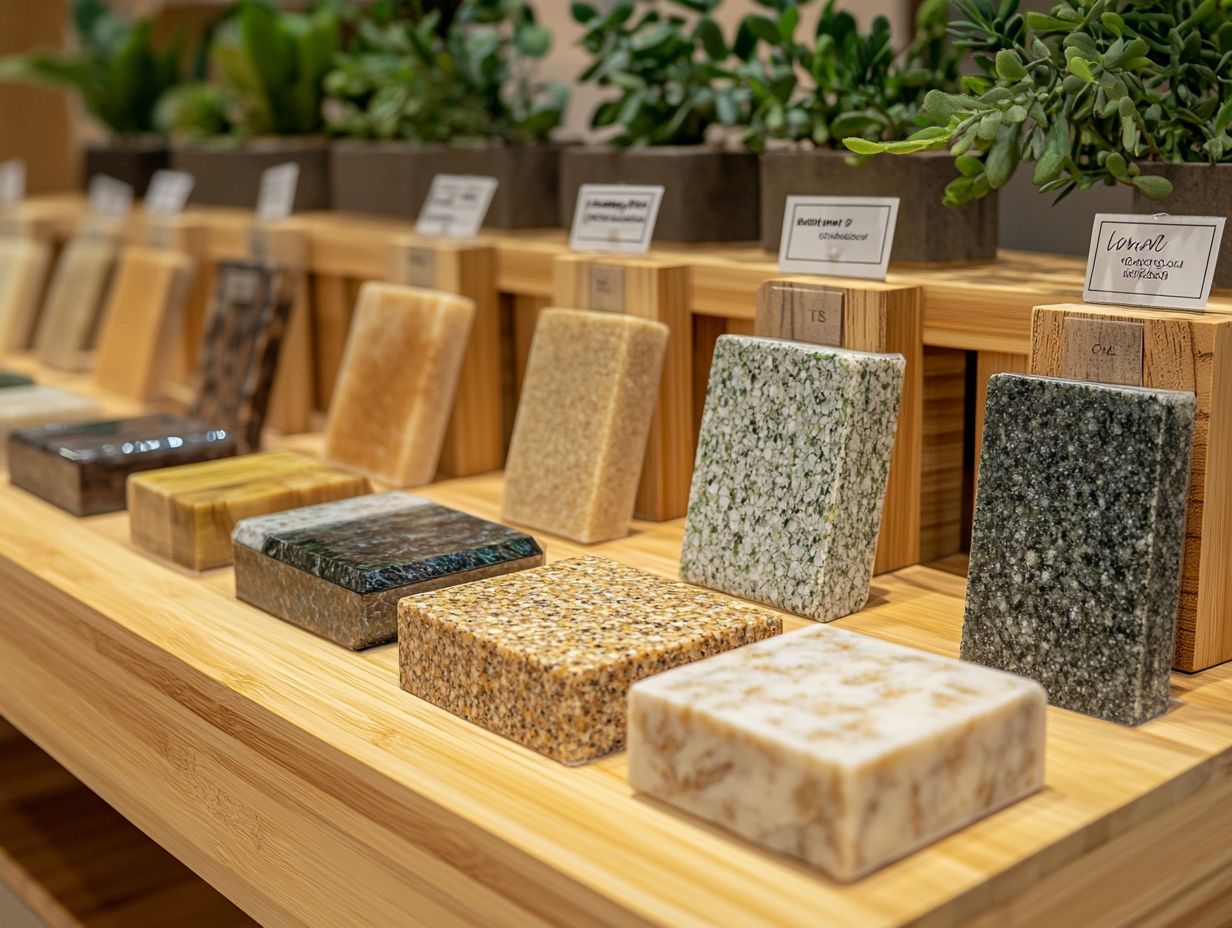
Explore a variety of sustainable countertops tailored to your needs, allowing you to find the ideal eco-friendly choice for your home.
Whether you re drawn to the warmth of bamboo, the innovation of paper composite, or the sleekness of stainless steel, these materials not only provide durability and style but also address important environmental considerations.
Each type brings its own distinct advantages, making it crucial for you to assess your specific needs and preferences as you select countertop options that resonate with your values.
Natural and Recycled Materials
Natural and recycled materials are leading the charge in sustainable countertops, presenting you with a variety of eco-friendly options that excel in both quality and visual appeal.
Granite and quartz, in particular, shine brightly with their durability and timeless elegance, making them not just a practical choice but also a stunning focal point for any kitchen or bathroom.
On the other hand, using recycled materials such as glass or paper composite not only helps reduce landfill waste but also results in unique, artistic designs that elevate your space.
Bamboo countertops deserve your attention for their remarkable renewability; bamboo can grow up to three feet in just a single day, providing an exceptionally sustainable resource.
Beyond their environmental advantages, bamboo countertops offer aesthetic versatility, seamlessly integrating into various decor styles, from modern chic to rustic charm.
Start your sustainable kitchen journey today!
Comparing Durability and Maintenance
When selecting sustainable countertops, be sure to consider durability and maintenance needs, as these factors play a significant role in their long-term performance and appearance.
Choosing the right countertop material can greatly influence the functionality of your kitchen or bathroom. For instance, stainless steel countertops are renowned for their robust nature and resistance to heat and spills, making them a favored choice in commercial kitchens. On the other hand, granite countertops provide a stunning natural stone aesthetic but require regular sealing to maintain their durability and ward off stains.
If sustainability is a priority, recycled material countertops present an eco-friendly option that often features a unique look, although their resistance to scratches and heat can vary.
Each of these materials comes with its own maintenance requirements and lifespan, so matching your eco-friendly values is essential.
Factors to Consider When Choosing Sustainable Countertops
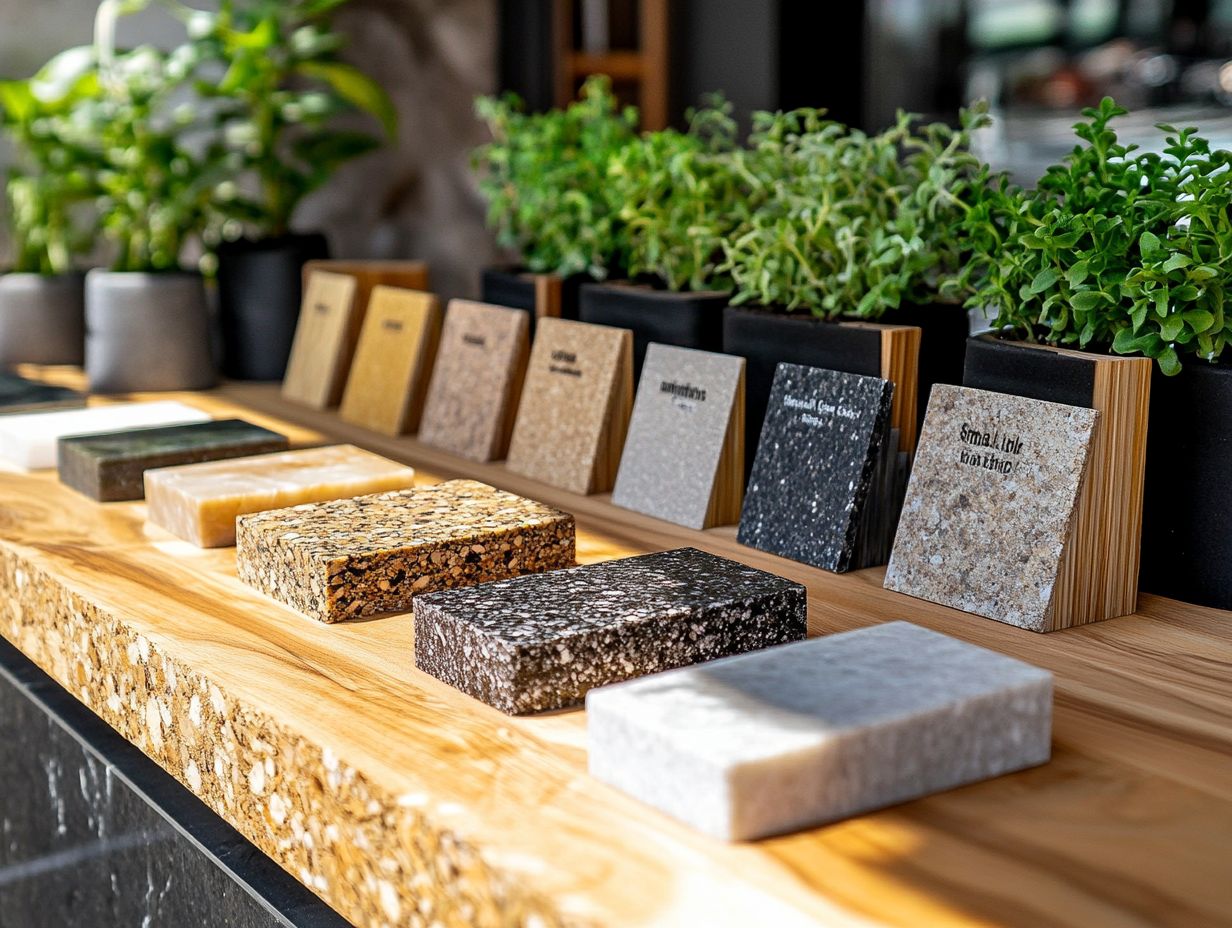
Selecting the perfect sustainable countertop requires you to carefully consider several key factors, such as cost, availability, design, and aesthetic appeal all of which play a significant role in your decision-making journey.
With eco-friendly countertops becoming increasingly popular, the market now boasts a diverse array of sustainable materials, giving you the opportunity to discover options that align with both your budget and your kitchen vision.
Whether you re drawn to the elegance of luxurious quartz countertops or the practicality of budget-friendly paper composite surfaces, grasping these factors is crucial for making a well-informed choice.
Cost and Availability
Cost and availability are two essential factors you need to consider when exploring sustainable countertop options, as these can vary significantly depending on the material type and sourcing.
Eco-friendly materials like bamboo, recycled glass, and quarried stone (natural stone mined from the earth) can have a wide price range, influenced by their origins and local availability. Opting for locally sourced options not only supports community businesses but also often lowers transportation costs and minimizes environmental impact.
Explore exciting financing solutions or government incentives aimed at promoting sustainable building practices, making the investment more manageable.
Numerous local suppliers and online marketplaces feature eco-friendly materials, enabling you to make informed and responsible choices for your countertop selections.
Design and Aesthetic
Design and aesthetics are paramount when selecting sustainable countertops, as they should effortlessly align with your overall kitchen remodeling vision.
As you explore sustainable materials, you ll discover a range of options that beautifully marry elegance and eco-friendliness at the heart of your home. For example, bamboo provides a sleek, modern appeal, while reclaimed wood adds a touch of cozy, rustic charm.
Incorporating natural stones like recycled granite or quartz not only enhances durability but also introduces a unique texture to your space. You can customize the colors of these materials to perfectly match your personal tastes; warm earth tones evoke a welcoming atmosphere, while cooler shades convey a sense of sophisticated elegance.
Choose materials that reflect your style and commitment to sustainability today!
Installation and Maintenance of Sustainable Countertops
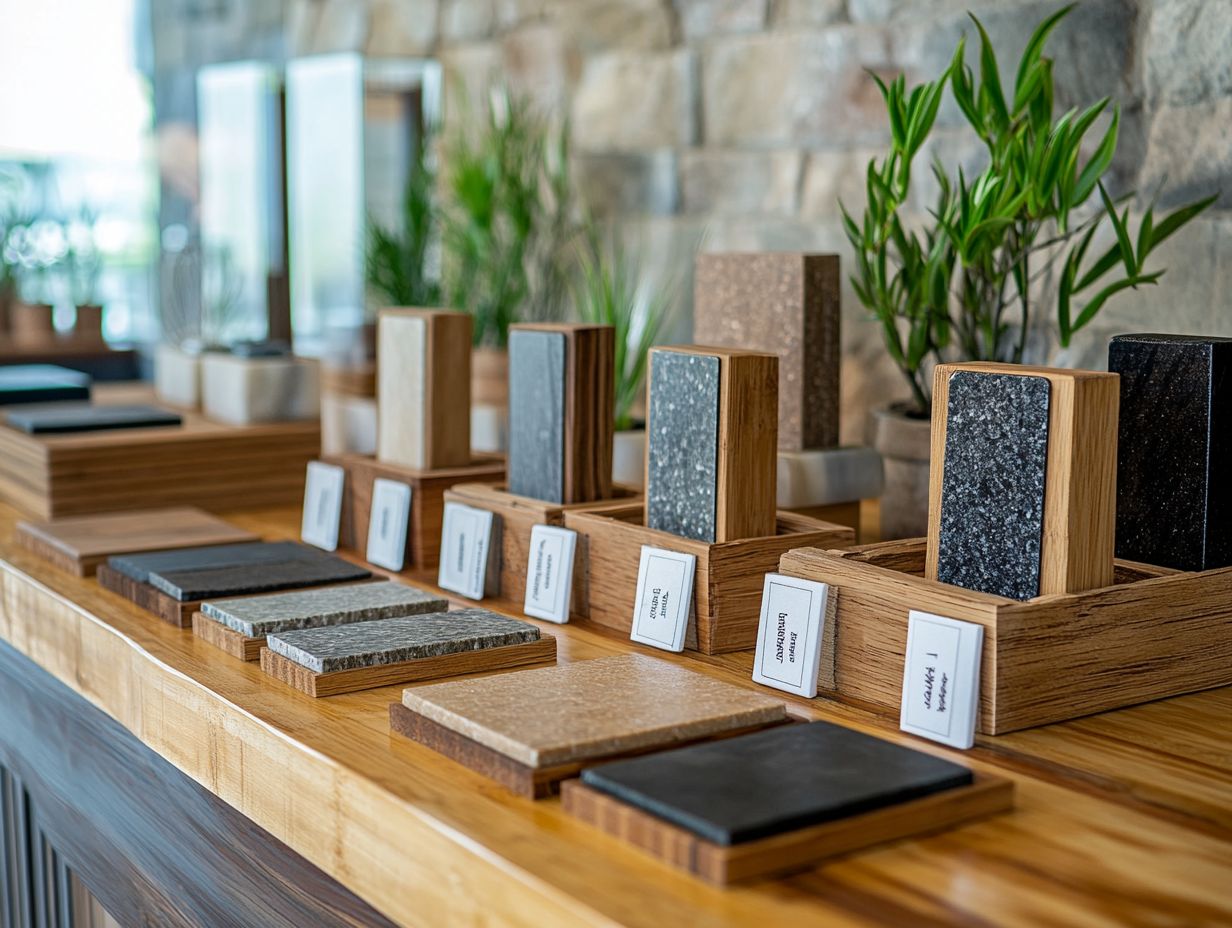
You must properly install and maintain sustainable countertops for longevity and optimal performance. It s important to recognize that specific techniques are tailored to the materials you choose.
Whether you re opting for eco-friendly options like quartz or sleek stainless steel, grasping the best practices for installation can help you avoid future issues and elevate the overall functionality of your kitchen.
Regular maintenance is key to preserving the beauty and sustainability of your countertops, allowing them to continue enhancing your space for years to come. Take action now to ensure your sustainable countertops last a lifetime!
Proper Installation Techniques
Proper installation techniques are crucial for ensuring that sustainable materials not only function optimally. They also maintain their visual appeal over time.
When you re working with materials like bamboo, recycled glass, and paper composite, you can use specific strategies to streamline the installation process while championing environmental stewardship.
For bamboo, it s vital to allow for proper acclimatization to your local environment. This means letting the material adjust its moisture content before installation, which helps minimize potential expansion or contraction.
Recycled glass countertops require specialized adhesives that provide a strong bond while being low in harmful chemicals that can affect air quality. This ultimately enhances indoor air quality.
As for paper composite surfaces, they thrive with precise cutting tools that minimize waste. Energy-efficient installation methods should prioritize manual tools over electric ones whenever possible.
By following these techniques, ensure your installation is stunning and functional today with eco-friendly standards.
Tips for Maintaining Sustainability
Maintaining sustainability in your kitchen means embracing eco-friendly cleaning methods and taking diligent care of your sustainable countertops to preserve their integrity.
By opting for non-toxic cleaning products like vinegar, baking soda, and essential oils, you can effectively cleanse surfaces without harming the environment.
It’s crucial to follow specific care guidelines tailored to different materials. For example, bamboo may call for gentler scrubbing, while recycled glass can withstand tougher stains.
Regularly seal wooden surfaces and address spills promptly to enhance their longevity.
Keep in mind that routine maintenance not only ensures your countertops remain pristine but also significantly extends their lifespan, ultimately contributing to a greener home and reducing waste.
More Tips for Sustainable Living in the Kitchen
Embracing sustainable living in your kitchen goes beyond merely choosing eco-friendly countertops; it involves adopting a range of practices that foster a greener home environment.
By implementing energy-efficient methods in both cooking and cleaning, you not only reduce your environmental impact but also elevate your overall kitchen experience.
When you make thoughtful choices, you create a kitchen space that reflects your values and contributes to a healthier planet.
Start implementing these tips today for a more sustainable kitchen!
Eco-friendly Cleaning and Cooking Methods
Eco-friendly cleaning and cooking methods are essential for sustainable living. They enhance your health and reduce environmental impact.
By choosing cleaning products that break down naturally, like vinegar and baking soda, you can keep your home clean without harmful chemicals. Techniques like steam cleaning sanitize surfaces and cut down on toxic cleaners.
For cooking, energy-efficient appliances such as induction cooktops and pressure cookers can lower your electricity use. These modern methods save energy and speed up meal prep, perfect for busy lifestyles while being kind to the planet.
Frequently Asked Questions
What are sustainable countertops? Sustainable countertops are made from eco-friendly materials that have a minimal environmental impact.
Why should I choose sustainable countertops? Choosing these countertops helps reduce your carbon footprint and supports the use of natural resources. It promotes a healthier living space for your family.
What are some popular sustainable countertop materials? Popular options include bamboo, recycled glass, reclaimed wood, and recycled paper composite.
How can I determine if a countertop is truly sustainable? Look for certifications from trusted organizations like the Forest Stewardship Council (FSC) or the GreenGuard Environmental Institute. Research the manufacturing process and materials used as well.
Are sustainable countertops more expensive than traditional options? They may cost more upfront, but they often last longer and require less maintenance, making them cost-effective over time.
Can I find a sustainable countertop in the style I want? Absolutely! There are many styles and designs for sustainable countertops, just like traditional ones. Choose colors, patterns, and textures that match your taste and decor.
Start your eco-friendly journey today!




